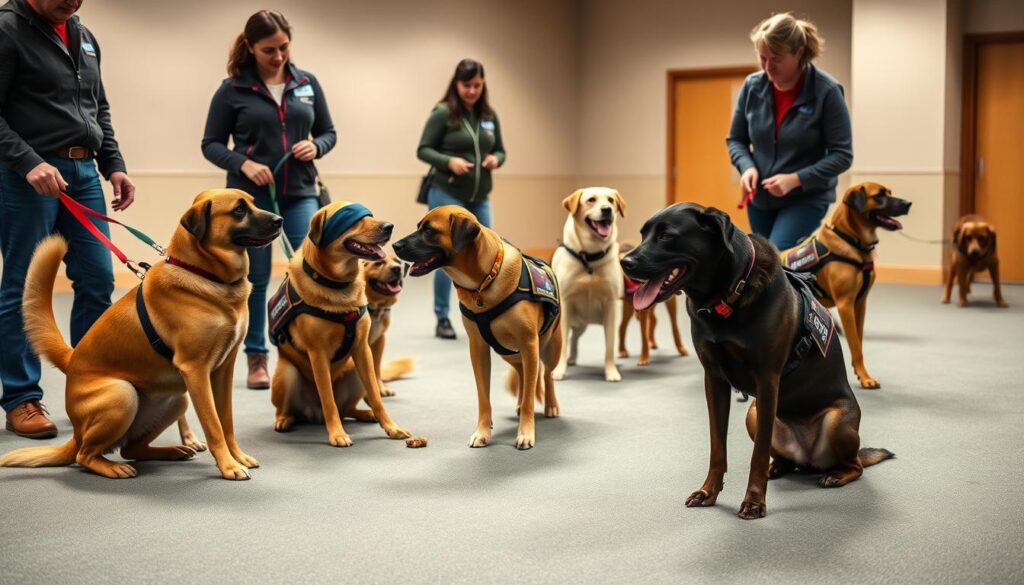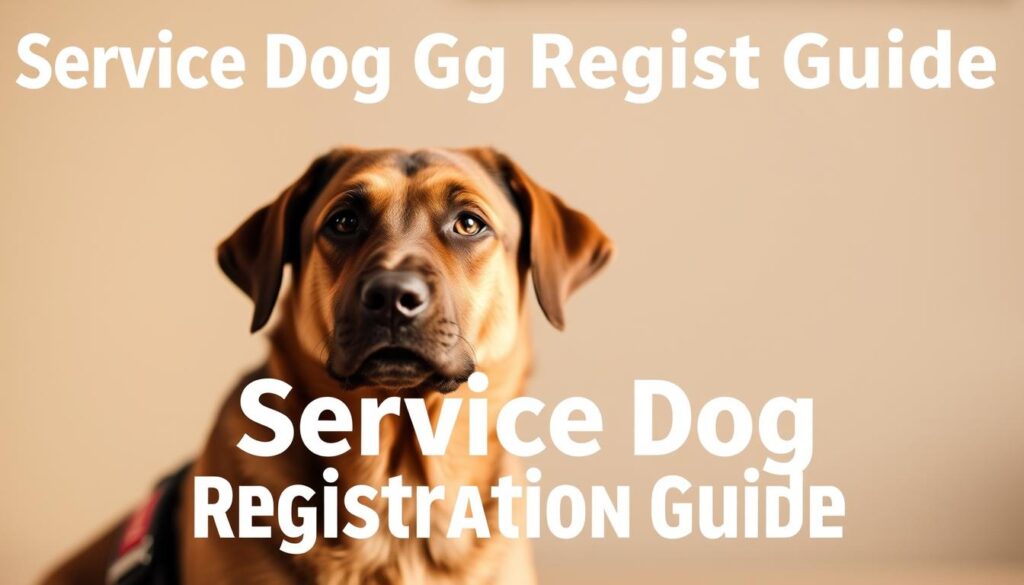How to Register My Dog as a Service Dog
My world changed when I realized my loyal dog could be more than just a pet. Service dogs are not just animals. They are lifelines for people with disabilities, giving them independence and support.
Wondering how to register your dog as a service dog? You’ll find there’s no official process in the United States. Service dogs are trained animals that help people with disabilities. They need a lot of training and dedication.
Understanding the service dog registration process is key. It’s not just about getting a certificate. It’s a journey of training, commitment, and trust between you and your dog.
Key Takeaways
- No official federal registration exists for service dogs
- Service dogs must be trained to perform specific disability-related tasks
- ADA protects service dog handlers’ rights in public spaces
- Proper training is crucial for service dog effectiveness
- Each service dog’s role is unique to their handler’s needs
Understanding Service Dogs and Their Roles
Service dogs are vital for people with disabilities. They do more than just keep someone company. They offer crucial help that boosts a person’s life and freedom.
Service dogs and emotional support animals are not the same. Getting an emotional support animal is easy. But, service dogs need a lot of training and certification.
Distinguishing Service Dogs from Emotional Support Animals
Here’s what sets service dogs apart from emotional support animals:
- Service dogs are trained for specific tasks.
- They have the right to go anywhere with their owners.
- They need a lot of training and certification.
- They need medical proof of their need.
Types of Service Dogs and Their Specialized Tasks
Service dogs help in many ways. They are trained for different tasks:
| Service Dog Type | Primary Tasks |
|---|---|
| Guide Dogs | Help visually impaired people navigate. |
| Hearing Assistance Dogs | Alert deaf people to sounds like doorbells. |
| Mobility Assistance Dogs | Give physical support and get things for you. |
| Medical Alert Dogs | Spot seizures, blood sugar changes, or allergens. |
| Psychiatric Service Dogs | Help people with mental health issues. |
Each service dog gets a lot of training. This ensures they can do their job well and reliably.
Legal Requirements for Service Dogs in the U.S.
It’s key to know the laws about service dogs for people with disabilities. These laws help ensure that service dog handlers get the support they need everywhere in the U.S.
The Americans with Disabilities Act (ADA) is the main law protecting service dogs. It sets important rules to help people with disabilities and their service animals.
Key ADA Protections for Service Dogs
- Service dogs are allowed in all public spaces
- Businesses cannot request detailed medical documentation
- No official service dog registration site exists
- Handlers are not required to provide certification
Even though there’s no single place to register service dogs, it’s important to know your rights. State laws can add more protection for service dog owners.
State-Specific Service Dog Regulations
Every state has its own rules for service dogs, building on the ADA’s basics. Some states have stricter rules for service dogs in public places.
Service dogs are working animals, not pets, and are protected under federal civil rights laws.
Service dog handlers should be ready to explain their dog’s job and show the dog’s training. Knowing these rules helps everyone respect the handler and their service dog.
Steps to Determine if Your Dog is a Service Dog Candidate
Not every dog can become a service animal. To register your dog, you must evaluate their potential, temperament, and task abilities. This is for individuals with disabilities.
Service dog certification is more than just loving your dog. You need to check several key factors. These determine if your dog can be a working service animal.
Evaluating Your Dog’s Core Temperament
Service dogs have special traits that pets don’t. They need to be calm, focused, and obedient. They should also handle crowds well.
- Calm demeanor in various environments
- Low reactivity to sudden noises or movements
- High focus and minimal distractibility
- Consistent obedience and impulse control
- Ability to remain composed in crowded spaces
Essential Training Considerations
Training a service dog is a big commitment. Professional assessments can show if your dog is suited for service work.
| Evaluation Criteria | Ideal Characteristics |
|---|---|
| Temperament Stability | Predictable, non-aggressive behavior |
| Physical Capability | Appropriate size and strength for tasks |
| Learning Capacity | Quick comprehension of complex commands |
| Stress Tolerance | Remains calm under pressure |
Not all dogs can be service animals. A professional evaluation is key to understanding your dog’s potential.
Training Your Dog for Service Tasks
Service dog training turns an ordinary dog into a life-changing companion for people with disabilities. It takes dedication, patience, and a clear plan to train your dog.

To develop a service dog, you need various training methods. These methods cover basic obedience and specific tasks. First, understand your dog’s strengths and what they can do.
Choosing the Right Training Program
There are many ways to train your service dog:
- Self-training with professional help
- Professional service dog training programs
- Training for specific disabilities
- Working with a certified private trainer
“The right training program can transform your dog into an invaluable support partner.” – Service Dog Training Experts
Key Commands and Skills to Master
Good service dog training means learning key commands and skills:
- Basic obedience commands
- How to behave in public
- Tasks specific to disabilities
- Staying focused despite distractions
- Keeping calm in stressful situations
| Training Area | Core Skills | Difficulty Level |
|---|---|---|
| Obedience | Sit, Stay, Come, Heel | Beginner |
| Task-Specific Training | Medical Alert, Mobility Support | Advanced |
| Public Behavior | Calm Demeanor, Ignore Distractions | Intermediate |
Remember, consistent training and positive reinforcement are key to developing a successful service dog.
Documenting Your Dog’s Service Dog Status
Understanding service dog documentation can be tricky. The United States does not have a national registry for service animals. This means there’s no official service dog ID registration required.
The real key is showing your dog’s abilities. It’s not about an official site. It’s about proving your dog can do important tasks.
Understanding Documentation Requirements
Even though there’s no law requiring specific papers, some items can help prove your dog’s status:
- A letter from a healthcare provider explaining your disability
- Training records showing your dog’s skills
- A detailed list of your dog’s trained tasks
Identifying Gear for Service Dogs
While you don’t have to use special gear, it can help show your dog’s role:
- Special service dog vests
- Patches for specific tasks
- ID cards from training groups (optional)
“Your service dog’s value is defined by their trained tasks, not by registration paperwork.”
The most crucial thing about a service dog is their ability to do specific tasks. No ID can replace the real help your dog gives.
Where to Get Training and Support for Service Dogs
Finding the right support for service dog training and certification can be tough. Your journey to develop a reliable service dog needs careful research and professional help.

Understanding the world of service dog training is key. Professional guidance can greatly improve your dog’s training for specific tasks.
Certified Service Dog Trainers
When looking for service dog training and certification, consider these options:
- Professional service dog training organizations
- Specialized disability assistance dog trainers
- Certified canine behavior specialists
Some trainers focus on specific disability support needs. Choosing a trainer with your specific needs in mind is important.
Online Resources and Communities
Digital platforms offer a lot of support for those wondering how to register their dog as a service dog. These resources share valuable insights:
- Service dog training forums
- Virtual training workshops
- Professional networking groups
Service dog training costs vary a lot. Some organizations give dogs for free, while others cost a lot. Look for financial help programs to cover training costs.
Professional training turns a pet into a reliable service companion.
Spending time on thorough research and connecting with reputable training resources is crucial. It will help you develop a skilled service dog tailored to your needs.
How to Handle Public Access Rights
Understanding your rights when you’re out with a service dog is key. Service dog laws help people with disabilities get around public places easily. They make sure you face fewer barriers.
Registering your dog as a service animal gives you important legal protections. These protections let your service dog go with you in many places. Places where others might not be allowed.
Understanding Your Service Dog’s Access Rights
Service dogs can go into many public areas. These include:
- Restaurants and cafes
- Retail stores
- Hospitals and medical facilities
- Libraries
- Public transportation
- Workplaces
Handling Potential Access Challenges
If you run into trouble, stay calm and know your rights. Business owners can only ask two things:
- Is the dog a service animal because of a disability?
- What task has the dog been trained for?
You don’t have to show medical papers or explain your dog’s tasks in detail.
| Permitted Actions | Prohibited Actions |
|---|---|
| Bring service dog everywhere | Deny service dog entry |
| Request reasonable accommodations | Ask invasive medical questions |
| Advocate for your rights | Segregate or isolate service dog |
Your service dog is a vital part of your independence. Knowing your rights helps you move through public spaces with confidence and legally.
Maintaining Your Service Dog’s Training and Skills
Keeping your service dog sharp and proficient requires consistent effort and dedication. Service dog training and certification is an ongoing process. It demands regular attention to maintain the highest level of performance and reliability.
Effective service dog handlers understand that skill maintenance is crucial for their dog’s success. Your furry companion needs continuous reinforcement of learned tasks and behaviors. This is to remain an exceptional working partner.
Routine Training Refreshers
Regular training refreshers help prevent skill decay and keep your service dog’s abilities razor-sharp. Consider implementing these strategies:
- Practice core commands daily for 10-15 minutes
- Rotate through different training scenarios
- Use positive reinforcement techniques
- Simulate real-world working environments
Health and Wellbeing Checks
A comprehensive approach to service dog registration includes maintaining your dog’s physical and mental health. Regular veterinary check-ups are essential.
| Health Check Category | Recommended Frequency |
|---|---|
| Veterinary Examination | Annually or Bi-Annually |
| Dental Cleaning | Every 6-12 Months |
| Physical Fitness Assessment | Every 4-6 Months |
| Mental Stimulation Evaluation | Quarterly |
Your service dog’s continued effectiveness depends on consistent training, health monitoring, and a strong partnership. Invest time in maintaining their skills and well-being. This ensures they can perform their critical support tasks with excellence.
Traveling with a Service Dog
Traveling with a service dog needs careful planning. You must know the service dog laws and requirements. Whether you’re going on a long road trip or flying, being prepared is crucial. This ensures a smooth journey for you and your service dog.
Even though service dog ID registration isn’t always required, it can make travel easier. Airlines and other transport services like to see clear proof that your dog is a service animal.
Air Travel Regulations for Service Dogs
When flying with a service dog, there are a few things to keep in mind:
- Call your airline ahead of time to learn about their service dog rules
- Make sure your dog is okay with being in small spaces
- Have all the right documents to show your dog’s service status
Road Trip Tips for Service Dog Owners
For long trips, planning is key to keep your service dog happy and safe:
- Stop often for your dog to use the bathroom and get some exercise
- Have a special travel bag with:
- Water and a bowl
- A familiar blanket or bed
- First-aid supplies
- Any medicine your dog needs
- Stick to your dog’s usual eating and medicine schedule
| Travel Mode | Key Considerations | Recommended Preparation |
|---|---|---|
| Air Travel | Size restrictions, airline policies | Advance notification, health certificate |
| Road Trip | Comfort, safety, regular breaks | Travel kit, familiar items, medication |
| Public Transportation | Local service dog regulations | Research local laws, calm demeanor training |
Remember, successful travel with a service dog depends on preparation, understanding regulations, and maintaining your dog’s training and comfort.
Resources for Service Dog Owners
Dealing with service dogs can be tough, but many resources are available to help. There’s no single site for service dog registration, but many groups offer key support. Assistance Dogs International (ADI) is a global group that links programs that train and place assistance dogs.
Finding the right support starts with connecting to the right communities. Groups like Service Dogs of America and the International Association of Assistance Dog Partners offer a lot of help. They can guide you on emotional support animal registration and service dog care.
Helpful Websites and Online Resources
Online platforms are a big help for service dog owners. Sites like 4 Paws for Ability and Canine Companions for Independence have lots of info on training, rights, and community connections. You’ll find expert tips, training tools, and networks to strengthen your bond with your service dog.
Support Groups for Service Dog Handlers
Joining support groups can really help your service dog journey. Local and online groups, like Facebook groups for service dog handlers, offer a place to share, ask, and get support. These groups are great for learning tips and keeping your service dog’s skills sharp.
FAQ
Is there an official registration process for service dogs in the United States?
No, there’s no official registration for service dogs in the U.S. The Americans with Disabilities Act (ADA) doesn’t require any specific certification. What’s important is that the dog is trained to help with a disability.
What’s the difference between a service dog and an emotional support animal?
Service dogs are trained to help people with disabilities and have wide rights to be in public. Emotional support animals provide comfort but have fewer legal rights. Service dogs get protection under the ADA, while emotional support animals have less legal support.
What qualifies a dog to become a service dog?
A service dog must be trained to help with a disability. It needs to be calm, trainable, and focus in different places. It’s the dog’s ability to perform tasks that matters, not its breed or size.
Do I need special documentation to prove my dog is a service dog?
You don’t need official documents, but a letter from a healthcare provider can help. Service dog vests or ID cards can also reduce questions from the public.
How long does it take to train a service dog?
Training a service dog takes 1-2 years. It needs constant, intense training in obedience, public access, and disability tasks. Training can cost ,000 to ,000, or you can train it yourself with a lot of effort.
Where are service dogs allowed to go?
Service dogs can go almost anywhere public, like restaurants, stores, and schools. They must be well-behaved and can’t be turned away because of fears or allergies. But, they can be asked to leave if they’re not well-behaved or not housebroken.
Can my pet become a service dog?
Not all pets can be service dogs. They need the right temperament, be trainable, and perform specific tasks for a disability. Professional assessment and training are needed to see if a dog is suitable.
Do service dogs need special health care?
Yes, service dogs need regular vet visits, vaccinations, and care. They also need ongoing training, mental stimulation, and rest to do their job well and stay healthy.
How do I travel with a service dog?
Service dogs can usually go with their handlers on planes, trains, and buses. Check the carrier’s rules first. Make sure your dog is well-trained, calm, and follows travel rules.
Are there financial assistance programs for service dog training?
Yes, many nonprofits and grants help with service dog training costs. Organizations for veterans, disability support, and foundations offer funding or low-cost training to help get service dogs.
There are no reviews yet. Be the first one to write one.

